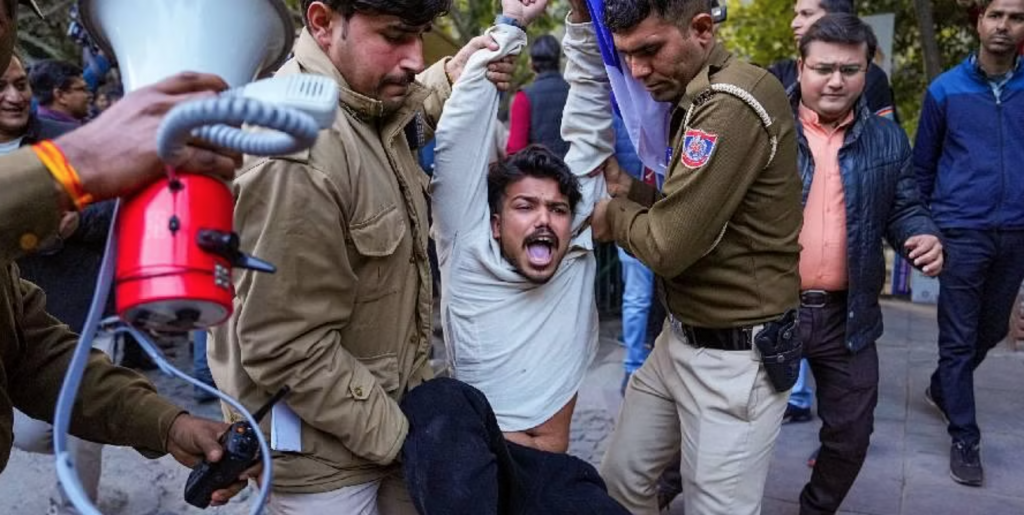24 students detained in DU for attempting to screen BBC documentary

The BBC documentary on Prime Minister Narendra Modi's alleged role in the 2002 Gujarat riots has kicked up a storm in India, with students at several prestigious universities across the country attempting to screen the contentious documentary that the government blocked from viewing.
Sana Ejaz | TwoCircles.net
NEW DELHI — Delhi Police on Friday detained 24 students from the Delhi University’s Arts Faculty for planning to screen a BBC documentary on Prime Minister Narendra Modi’s alleged role in the 2002 Gujarat riots, PTI reported.
“Around 4 pm, some 20 people came outside the Arts Faculty gate to screen the banned BBC documentary,” Deputy Commissioner of Police (North) Sagar Singh Kalsi said. “As it can cause disturbance of peace and tranquillity in the area, they were asked to disperse from there. When they did not, they were detained.”
Earlier on Friday, the police had banned large gatherings inside the campus after Delhi University Proctor Rajni Abbi said the administration would not allow the screening planned by some student bodies.
Ahead of the planned screening, Section 144 was also imposed banning large gatherings at the Faculty of Arts (DU) on Friday, news agency ANI reported.
Heavy police deployment was done inside Ambedkar University as well to stop the screening, PTI reported.
The Students’ Federation of India unit of Ambedkar University alleged that the screening could not be held as the college administration disconnected the power supply. The students watched the documentary on their personal electronic devices.
[caption id="attachment_448150" align="aligncenter" width="696"] Police personnel detain members of Bhim Army Student Federation for planning to screen the BBC documentary film "India: The Modi Question", at Delhi University Arts Faculty, in New Delhi on Jan. 27, 2023 | Photo: PTI[/caption]
Police personnel detain members of Bhim Army Student Federation for planning to screen the BBC documentary film "India: The Modi Question", at Delhi University Arts Faculty, in New Delhi on Jan. 27, 2023 | Photo: PTI[/caption]
The first episode of the BBC’s two-part documentary titled India: The Modi Question was released on January 17. It alleges that a team sent by the British government had found that Modi, who was the chief minister of Gujarat when the riots took place, was “directly responsible for a climate of impunity” that led to the violence against Muslims. The second part was released on Tuesday.
While the documentary has not been made available in India, pirated links to the film have been shared widely on online platforms.
On January 20, the government used emergency powers available under the Information Technology Rules, 2021, to issue directions to YouTube and Twitter to block clips of the documentary from being shared. The foreign ministry had described the documentary as “a propaganda piece designed to push a particular discredited narrative”.
Screenings of the documentary were disrupted at Delhi’s Jawaharlal Nehru University and Jamia Millia Islamia University earlier this week. On Wednesday, the Delhi Police detained at least 12 students ahead of a planned screening of the documentary.
https://twocircles.net/2023jan26/448107.html
On Tuesday, JNU students alleged that they were attacked with stones after a power and internet outage at the campus prevented the screening. Students also alleged that the power was intentionally cut off by the university administration. The administration had blamed it on the electricity outage that had affected part of the campus. “There was a major line fault. Even the faculty residences and other facilities are without light,” JNU Vice-Chancellor Santishree Dhulipudi had said.
https://twocircles.net/2023jan26/448101.html
Claims made by BBC documentary
The controversial BBC documentary cites a hitherto unknown report prepared by an inquiry team sent by the British government to look into the 2002 Gujarat riots. The team had alleged that Modi had prevented the Gujarat Police from acting to stop violence targeted at Muslims, the BBC documentary claimed.
A former British senior diplomat, one of the investigators sent by the United Kingdom government, had said in the documentary that the violence had been planned by the Vishwa Hindu Parishad, an affiliate of the Rashtriya Swayamsevak Sangh.
Sana Ejaz is an independent journalist from Bihar. She tweets @SanaEjaz
